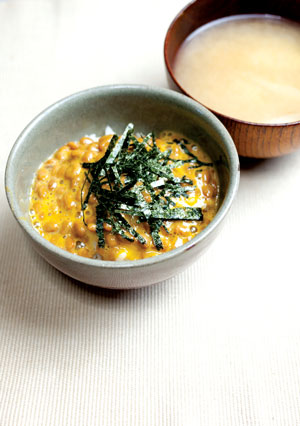Jul. 27, 2012 Research Highlight Biology
Tracking down prostate cancer risks
Diversifying the populations of Japanese men used in a study plotting their risk to prostate cancer reveals a potential dietary link
 Figure 1: A traditional Japanese breakfast of natto (fermented soy beans), sprinkled with compressed seaweed, is rich in vitamin K, a compound traditionally thought to fight cancer. © iStockphoto/ runin
Figure 1: A traditional Japanese breakfast of natto (fermented soy beans), sprinkled with compressed seaweed, is rich in vitamin K, a compound traditionally thought to fight cancer. © iStockphoto/ runin
Three previously unknown loci, or regions of the genome, are associated with an increased risk of Japanese men developing prostate cancer, according to RIKEN-led research on single nucleotide polymorphisms (SNPs) associated with this disease1. An SNP associated with prostate cancer at a fourth locus—related to one found earlier in European men—appears to be associated with diet, the first hard evidence of such an environmental link.
These findings are the result of a genome-wide association study (GWAS) by Hidewaki Nakagawa of the RIKEN Center for Genomic Medicine, Yokohama, and colleagues at universities and institutes in Japan and the USA. Repeating earlier work in Europeans, they compared the genetic profiles of Japanese groups of prostate cancer sufferers with non-sufferers.
“We are aiming to construct a genetic risk model for the development of prostate cancer that we hope will [allow personalization of] prostate cancer diagnosis in the Japanese population,” Nakagawa says.
The researchers broadened the scope of an earlier study by adding three, more diverse, populations of Japanese men. One population included a cohort of men from Hawaii and California with Japanese ancestry. They tested nine loci that their previous study had indicated were nominally associated with the development of prostate cancer, but were not significant statistically.
The latest study not only allowed for testing of a single ethnic group likely to be affected by different environmental factors, but also provided a larger population size when combined with those surveyed in the previous work for a meta-analysis. The joint numbers included 7,141 prostate cancer sufferers and 11,804 non-sufferers.
The most recently identified loci are on chromosomes 11, 10, 3 and 2. Those on chromosomes 10 and 3 are not related to any known genes or proteins, but the researchers suggest they may be regions linked with gene regulation. The locus on chromosome 11 is associated with a gene whose function is unknown, but the locus on chromosome 2 is linked with GGCX, a vitamin K-dependent enzyme that regulates blood clotting, bone formation and cancer biology. Japanese foods such asnatto and seaweeds are rich in vitamin K, which is thought to protect against cancer (Fig. 1). Interestingly, the association of this SNP with prostate cancer was significant in all populations except for the Japanese in the USA, indicating that environmental factors, such as diet, are involved.
“These findings provide support for conducting GWAS for prostate cancer in diverse populations to identify risk loci for this genetically heterogeneous cancer,” the researchers note.
References
- 1. Akamatsu, S., Takata, R., Haiman, C.A., Takahashi, A., Inoue, T., Kubo, M., Furihata, M., Kamatani, N., Inazawa, J., Chen, G.K.,et al. Common variants at 11q12, 10q26 and 3p11.2 are associated with prostate cancer susceptibility in Japanese. Nature Genetics 44, 426–429 (2012). doi: 10.1038/ng.1104
